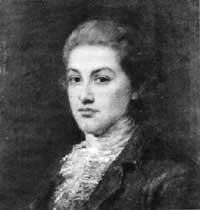Thomas Lynch Jr. (August 5, 1749–1779) served as a delegate from South Carolina to the Second Continental Congress.

He served alongside fellow South Carolina colony delegates Arthur Middleton, Thomas Heyward, and Edward Rutledge and was the youngest delegate in the Continental Congress. Lynch stepped in to fill his father's role when he became ill.
Tragic Life of the Signer
Thomas Lynch Jr. was born into a house of politics. He was born at Prince George Parish, Winyah, which later became known as Georgetown, South Carolina (not to be confused with Georgetown, Maryland). His father, Thomas Lynch Sr., was an influential figure in South Carolina politics, which allowed for one of the finest educations that money could afford. Thomas Lynch Jr. was educated at the Indigo Society School in Georgetown and then studied at Eton College and Gonville & Caius College in England. He, like many of the founding fathers, was educated in law and was well-schooled in political philosophy.
Thomas was only 27 when he stepped in for his ailing father, who had a stroke shortly before the Continental Congress called its second session. At 27, he was the youngest delegate to the Second Continental Congress and one of the few that had studied in England. He bravely signed the Declaration of Independence, therefore putting his life in jeopardy if the British were to capture him.
His mother remarried after his father passed away. His stepfather was also an influential man in South Carolina politics, Governor William Moultrie.
Lynch also served in the Continental Army in 1775 as captain of the First South Carolina regiment. He would leave that post when he was elected to the Continental Congress.
In 1779, Thomas Lynch Jr. became ill and, in an attempt to recover from his sickness, sailed to Paris in the West Indies with his wife. The ship entered into a great storm and disappeared at sea. Thomas Lynch Jr. and his wife died at a young age, which seemed to be the fate of most of the South Carolina delegates. Arthur Middleton and Edward Rutledge would also be two of the youngest delegates to serve in the Continental Congress and would also be some of the first delegates to die.
Before Lynch set sail on his voyage to St. Eustatius, he wrote up his will. Lynch, being an only child and one of the last heirs, required that the female relative who would inherit the plantation would need to retain the last name of Lynch in order to continue his family line. Although Lynch was one of the youngest founding fathers to die, his family's estate has survived the test of time as it still is in existence today.
Charles Goodrich, who wrote one of the most complete biographies about each of the Signers of the Declaration of Independence, said this about Thomas Lynch Jr.:
Although the life of Mr. Lynch was thus terminated, at an early age, he had lived sufficiently long to render eminent services to his country and to establish his character as a man of exalted views and exalted moral worth. Few men possessed a more absolute control over the passions of the heart, and few evinced in a greater degree the virtues which adorn the human mind. In all the relations of life, whether as a husband, a friend, a patriot, or the master of the slave, he appeared conscious of his obligations and found his pleasure in discharging them.

Thomas Lynch Jr. Facts: Online Resources
- Wikipedia - Thomas Lynch Jr. Facts
- Colonial Hall - Thomas Lynch Jr Biography
- Hopsewee Plantation - Thomas Lynch Jr House
- Thomas Lynch Jr - Signers of the Declaration of Independence Ancestry
- Thomas Lynch Jr - Find a Grave
- History Junkie’s Guide To The Signers of the Declaration of Independence
- History Junkie's Guide to American Revolutionary War
- History Junkie's Guide to South Carolina Colony
